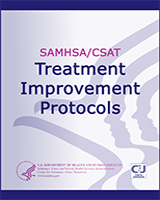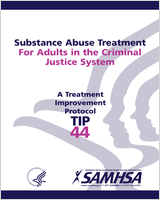NCBI Bookshelf. A service of the National Library of Medicine, National Institutes of Health.
Center for Substance Abuse Treatment. Planning for Alcohol and Other Drug Abuse Treatment for Adults in the Criminal Justice System. Rockville (MD): Substance Abuse and Mental Health Services Administration (US); 1995. (Treatment Improvement Protocol (TIP) Series, No. 17.)
This publication is provided for historical reference only and the information may be out of date.

Planning for Alcohol and Other Drug Abuse Treatment for Adults in the Criminal Justice System.
Show detailsCSAT Treatment Improvement Protocols (TIPs) are prepared by the Quality Assurance and Evaluation Branch to facilitate the transfer of state-of-the-art protocols and guidelines for the treatment of alcohol and other drug (AOD) abuse from acknowledged clinical, research, and administrative experts to the Nation's AOD abuse treatment resources.
The dissemination of a TIP is the last step in a process that begins with the recommendation of an AOD abuse problem area for consideration by a panel of experts. These include clinicians, researchers, and program managers, as well as professionals in such related fields as social services or criminal justice.
Once a topic has been selected, CSAT creates a Federal resource panel, with members from pertinent Federal agencies and national organizations, to review the state of the art in treatment and program management in the area selected. Recommendations from this Federal panel are then transmitted to the members of a second group, which consists of non-Federal experts who are intimately familiar with the topic. This group, known as a non-Federal consensus panel, meets in Washington for 5 days, makes recommendations, defines protocols, and arrives at agreement on protocols. Its members represent AOD abuse treatment programs, hospitals, community health centers, counseling programs, criminal justice and child welfare agencies, and private practitioners. A Chair for the panel is charged with responsibility of ensuring that the resulting protocol reflects true group consensus.
The next step is a review of the proposed guidelines and protocol by a third group whose members serve as expert field reviewers. Once their recommendations and responses have been reviewed, the Chair approves the document for publication. The result is a TIP reflecting the actual state of the art of AOD abuse treatment in public and private programs recognized for their provision of high quality and innovative AOD abuse treatment.
This TIP Planning for Alcohol and Other Drug Abuse Treatment for Adults in the Criminal Justice System presents guidelines to help bring the criminal justice and AOD systems closer together, to more systematically promote the acceptance of AOD treatment for criminal offenders, and to enhance the effectiveness of that treatment. The current state of AOD treatment in the criminal justice system is reviewed, and selected characteristics of AOD-involved offenders are described. An overview of the criminal justice continuum, from arrest and pretrial through jail and prison, is presented. Goals and components of AOD abuse treatment are described, and a systems approach to planning and implementing AOD treatment in the criminal justice system is outlined. Issues such as training staff, protecting client confidentiality, and evaluating processes and outcomes are addressed in individual chapters.
This TIP represents another step by CSAT toward its goal of bringing national leadership to bear in the effort to improve AOD abuse treatment.
Other TIPs may be ordered by contacting the National Clearinghouse for Alcohol and Drug Information (NCADI), (800) 729-6686 or (301) 468-2600; TDD (for hearing impaired), (800) 487-4889.
- What Is a TIP? - Planning for Alcohol and Other Drug Abuse Treatment for Adults ...What Is a TIP? - Planning for Alcohol and Other Drug Abuse Treatment for Adults in the Criminal Justice System
Your browsing activity is empty.
Activity recording is turned off.
See more...
